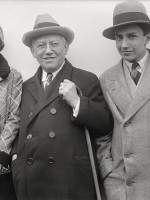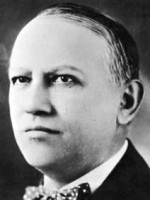James Whale is a Director, Scriptwriter, Producer, Co-Director and Editor British born on 22 july 1889 at Dudley (United-kingdom)
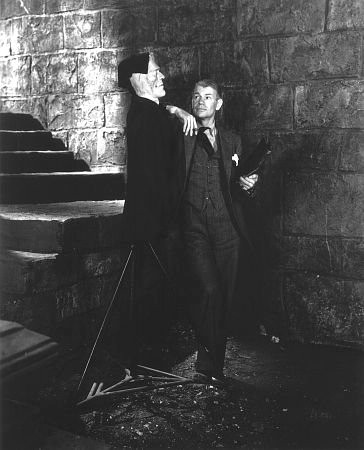
James Whale (22 July 1889 – 29 May 1957) was an English film director, theatre director and actor. He is best remembered for his four classic horror films: Frankenstein (1931), The Old Dark House (1932), The Invisible Man (1933) and Bride of Frankenstein (1935). Whale directed over a dozen films in other genres, including what is considered the definitive film version of the musical Show Boat (1936). He became increasingly disenchanted with his association with horror, but many of his non-horror films have fallen into obscurity.
Whale was born into a large family in Dudley, in the Black Country area of the English West Midlands. Whale discovered his artistic talent early on and studied art. With the outbreak of World War I, Whale enlisted in the British Army and became an officer. He was captured by the Germans and during his time as a prisoner of war he realized he was interested in drama. Following his release at the end of the war he became an actor, set designer and director. His success directing the 1928 play Journey's End led to his move to the United States, first to direct the play on Broadway and then to Hollywood to direct motion pictures. Whale lived in Hollywood for the rest of his life, most of that time with his longtime companion, producer David Lewis. Including Journey's End (1930), Whale directed a dozen films for Universal Studios between 1930 and 1936, developing a style characterized by the influence of German Expressionism and a highly mobile camera.
At the height of his career as a director, Whale directed The Road Back (1937), a sequel to All Quiet on the Western Front. Studio interference, possibly spurred by political pressure from Nazi Germany, led to the film's being altered from Whale's vision and The Road Back was a critical and commercial failure. A run of similar box-office disappointments followed and, while Whale would make one final short film in 1950, by 1941 his film directing career was over. Whale continued to direct for the stage and also rediscovered his love for painting and travel. His investments made him wealthy and he lived a comfortable retirement until suffering strokes in 1956 that robbed him of his vigor and left him in pain. Whale committed suicide on 29 May 1957 by drowning himself in his swimming pool.
Whale was openly gay throughout his career, something that was very unusual in the 1920s and 1930s. As knowledge of his sexual orientation has become more common, some of his films, Bride of Frankenstein in particular, have been interpreted as having a gay subtext and it has been claimed that Whale's refusal to remain in the closet led to the end of his career. However, Whale's associates dismissed the notions that Whale's sexuality informed his work or that it cost him his career.
Atteint d’une grave maladie, il mit fin à ses jours, le 29 mai 1957 à l'âge de soixante-sept ans, en se noyant dans la piscine de sa villa de Los Angeles. Il a été inhumé au cimetière du Forest Lawn Memorial Park, à Glendale en Californie (USA).
James Whale était ouvertement homosexuel.
Adaptation biographique
Sa vie, à peine romancée, a été illustrée en 1998 par le film Ni dieux ni démons (Gods and Monsters) écrit et réalisé par Bill Condon d'après une biographie Le Père de Frankenstein (Father of Frankenstein, 1995) de Christopher Bram, avec Ian McKellen dans le rôle du réalisateur et Brendan Fraser, dans celui du jardinier Clayton Boone qu'il avait embauché et dont il tomba amoureux. Ce film a reçu plusieurs dizaines de prix, dont le Prix de la critique internationale du Festival de Deauville en 1998 et l'Oscar du meilleur scénario en 1999.
Source : Wikidata
James Whale

- Infos
- Photos
- Best films
- Family
- Characters
- Awards
Nationality United-kingdom
Birth 22 july 1889 at Dudley (United-kingdom)
Death 29 may 1957 (at 67 years) at Hollywood (USA)
Birth 22 july 1889 at Dudley (United-kingdom)
Death 29 may 1957 (at 67 years) at Hollywood (USA)
James Whale (22 July 1889 – 29 May 1957) was an English film director, theatre director and actor. He is best remembered for his four classic horror films: Frankenstein (1931), The Old Dark House (1932), The Invisible Man (1933) and Bride of Frankenstein (1935). Whale directed over a dozen films in other genres, including what is considered the definitive film version of the musical Show Boat (1936). He became increasingly disenchanted with his association with horror, but many of his non-horror films have fallen into obscurity.
Whale was born into a large family in Dudley, in the Black Country area of the English West Midlands. Whale discovered his artistic talent early on and studied art. With the outbreak of World War I, Whale enlisted in the British Army and became an officer. He was captured by the Germans and during his time as a prisoner of war he realized he was interested in drama. Following his release at the end of the war he became an actor, set designer and director. His success directing the 1928 play Journey's End led to his move to the United States, first to direct the play on Broadway and then to Hollywood to direct motion pictures. Whale lived in Hollywood for the rest of his life, most of that time with his longtime companion, producer David Lewis. Including Journey's End (1930), Whale directed a dozen films for Universal Studios between 1930 and 1936, developing a style characterized by the influence of German Expressionism and a highly mobile camera.
At the height of his career as a director, Whale directed The Road Back (1937), a sequel to All Quiet on the Western Front. Studio interference, possibly spurred by political pressure from Nazi Germany, led to the film's being altered from Whale's vision and The Road Back was a critical and commercial failure. A run of similar box-office disappointments followed and, while Whale would make one final short film in 1950, by 1941 his film directing career was over. Whale continued to direct for the stage and also rediscovered his love for painting and travel. His investments made him wealthy and he lived a comfortable retirement until suffering strokes in 1956 that robbed him of his vigor and left him in pain. Whale committed suicide on 29 May 1957 by drowning himself in his swimming pool.
Whale was openly gay throughout his career, something that was very unusual in the 1920s and 1930s. As knowledge of his sexual orientation has become more common, some of his films, Bride of Frankenstein in particular, have been interpreted as having a gay subtext and it has been claimed that Whale's refusal to remain in the closet led to the end of his career. However, Whale's associates dismissed the notions that Whale's sexuality informed his work or that it cost him his career.
Biography
Né le 22 juillet 1889 dans une famille ouvrière en Angleterre, James Whale doit arrêter sa scolarité à l'âge de treize ans pour travailler. Jonglant avec les petits boulots, il se découvre peu à peu une passion pour le dessin et la peinture. La Première Guerre mondiale éclate alors qu'il n'a pas 25 ans. Engagé dans l'armée, il est fait prisonnier par l'armée allemande. Emprisonné dans un camp, il découvre le plaisir du théâtre amateur. Cette expérience est pour lui une révélation. À la fin de la guerre, il devient dessinateur humoristique dans la presse et entame une carrière de décorateur pour le théâtre. Toutefois, ce n'est qu'à 40 ans qu'il a l'occasion de diriger pour la première fois une pièce, "Journey's End". La pièce rencontre un tel succès qu'on lui propose de la monter à Broadway. New York accueille la pièce avec triomphe. Un succès qui va bientôt le conduire à Hollywood. Abandonnant le cinéma muet, les studios californiens se tournent vers le théâtre pour trouver les dialoguistes des nouveaux films parlants. James Whale est donc engagé par la Paramount. À la suite du succès de Dracula, la Universal charge Robert Florey de tirer un scénario du roman de Mary Shelley, Frankenstein ou le Prométhée moderne. Mais les séquences ne plaisent pas à la firme et elle décide de changer l'équipe : ce sera James Whale pour la réalisation.Atteint d’une grave maladie, il mit fin à ses jours, le 29 mai 1957 à l'âge de soixante-sept ans, en se noyant dans la piscine de sa villa de Los Angeles. Il a été inhumé au cimetière du Forest Lawn Memorial Park, à Glendale en Californie (USA).
James Whale était ouvertement homosexuel.
Adaptation biographique
Sa vie, à peine romancée, a été illustrée en 1998 par le film Ni dieux ni démons (Gods and Monsters) écrit et réalisé par Bill Condon d'après une biographie Le Père de Frankenstein (Father of Frankenstein, 1995) de Christopher Bram, avec Ian McKellen dans le rôle du réalisateur et Brendan Fraser, dans celui du jardinier Clayton Boone qu'il avait embauché et dont il tomba amoureux. Ce film a reçu plusieurs dizaines de prix, dont le Prix de la critique internationale du Festival de Deauville en 1998 et l'Oscar du meilleur scénario en 1999.
Best films
Usually with
Filmography of James Whale (22 films)
Director

They Dare Not Love (1941)
, 1h15Directed by Victor Fleming, James Whale
Origin USA
Genres Drama, War
Actors George Brent, Martha Scott, Paul Lukas, Peter Cushing, Sig Arno, Georgia Backus
Rating60%





A prince flees Austria when the Nazis take over and settles in London. He encounters a beautiful Austrian émigré who makes him realize his mistake in leaving. He strikes a deal with the Nazis to return in exchange for some Austrian prisoners, but discovers that the Nazis are not to be trusted.

Green Hell (1940)
, 1h27Directed by James Whale
Origin USA
Genres Adventure, Romance
Actors Douglas Fairbanks, Jr., Vincent Price, Joan Bennett, Alan Hale, George Sanders, John Howard
Rating57%





A group of adventurers journey deep into the South American jungle in search of ancient Incan treasure. A beautiful woman, brought to their camp by hired bearers, has come to join her husband, a newer member of the group, who was recently killed by hostile natives. As the months pass, jealousies and tempers flare as fights break out over the woman. The Incan treasure is eventually found but the treaure-seekers, now united by a common enemy, are about to be attacked by hordes of fierce natives armed with bows and poisoned arrows.

The Man in the Iron Mask (1939)
, 1h47Directed by James Whale
Origin USA
Genres Drama, Swashbuckler, Adventure, Historical, Romance
Themes Films about families, Politique, Political films, Histoire de France, Films about royalty
Actors Louis Hayward, Joan Bennett, Warren William, Joseph Schildkraut, Albert Dekker, Alan Hale
Rating69%





The 1939 adaptation alters history significantly by making Fouquet (Joseph Schildkraut) a thoroughly evil, scheming mastermind. He, Colbert (Walter Kingsford), d'Artagnan (Warren William) and the musketeers are the only ones who know of the existence of a twin brother, and Fouquet uses his influence to keep everyone silent. The main story was changed by portraying Louis XIV as selfish, cruel, and incompetent, and Philippe the kind-hearted brother who is raised by d'Artagnan and the musketeers and does not even know that he has an identical twin.
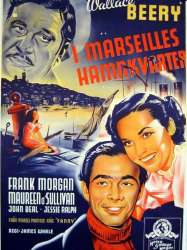
Port of Seven Seas (1938)
, 1h21Directed by James Whale
Origin USA
Genres Drama, Melodrama
Themes Films based on plays
Actors Wallace Beery, Frank Morgan, Maureen O'Sullivan, John Beal, Jessie Ralph, Etienne Girardot
Rating58%





In the French port of Marseille, a lovely young woman named Madelon (Maureen O'Sullivan) is in love with a young sailor, Marius (John Beal). Madelon in turn is loved by Honore Panisse (Frank Morgan), a well-to-do middle-aged sailmaker. When Marius finds out he must go to sea for three years, he leaves without saying goodbye to Madelon; in a note he tells her that it would break his heart to tell her in person. She rushes to the dock, but sees his ship sailing away and faints. Marius's father Cesar, (Wallace Beery) who already thinks of Madelon as one of the family, carries her to her home.

Wives Under Suspicion (1938)
, 1h9Directed by James Whale
Origin USA
Genres Drama, Crime
Actors Warren William, Gail Patrick, Constance Moore, William Lundigan, Frank Morgan, Ralph Morgan
Rating59%





A district attorney (William) realizes that his own wife (Patrick) might be having an affair while he is prosecuting a cuckolded murderer.

Sinners in Paradise (1938)
, 1h5Directed by James Whale
Origin USA
Genres Drama, Adventure
Actors Madge Evans, John Boles, Bruce Cabot, Marion Martin, Gene Lockhart, Nana Bryant
Rating57%





A passenger aircraft crashes in mid-Pacific and some of the survivors reach an island inhabited only by an American, Jim Taylor, with his Chinese servant, Ping. He declines to help them, telling them to build their own shelter and gather their own food and, though he has a boat and fuel, refusing to take them off. The reason why he wants to remain undisturbed, we learn, is that he is wanted for murder. In time his attitude to the intruders softens as they, despite endless bickering, manage to form a working community and he finds himself increasingly drawn to an attractive young nurse, Anne Wesson, who is running away from her husband. When the boat is prepared for a trip to civilisation, two crooked businessmen from the party steal it with Ping on board. In a fight, he kills them both and, fatally wounded, brings the boat back. The rest can then escape.

The Great Garrick (1937)
, 1h29Directed by Mervyn LeRoy, James Whale, Rowland Leigh
Origin USA
Genres Comedy, Romantic comedy, Romance
Themes Films about television, Films based on plays
Actors Brian Aherne, Olivia de Havilland, Edward Everett Horton, Melville Cooper, Lionel Atwill, Luis Alberni
Rating66%





In London in 1750, renowned English actor David Garrick announces onstage that he has been invited to Paris to work with the prestigious Comédie-Française. A person in the audience jeers that the French want him to teach them how to act. The playwright Beaumarchais (Lionel Atwill) returns to the Comédie-Française and attributes the remark to Garrick himself. The outraged French actors, led by their president, Picard (Melville Cooper), decide to make him an object of public ridicule. They take over a wayside inn where he will be staying, and Beaumarchais devises a plot intended to humiliate Garrick by frightening him into returning to England.

The Road Back (1937)
, 1h37Directed by James Whale
Origin USA
Genres Drama, War
Actors John King, Richard Cromwell, Slim Summerville, Maurice Murphy, Andy Devine, John Emery
Rating63%





The despair and disillusionment of four men who return to civilian life in Germany after the First World War.

Show Boat (1936)
, 1h53Directed by James Whale
Origin USA
Genres Drama, Comedy, Musical theatre, Musical, Romance
Themes Films about music and musicians, Musical films, Films based on plays, Films based on musicals
Actors Irene Dunne, Allan Jones, Charles Winninger, Paul Robeson, Helen Morgan, Helen Westley
Rating73%





The musical's story spans about forty years, from the late 1880s to the late 1920s. Magnolia Hawks is an eighteen-year-old on her family's show boat, the Cotton Palace which travels the Mississippi River putting on shows. She meets Gaylord Ravenal, a charming gambler, falls in love with him, and eventually marries him. Together with their baby daughter, the couple leaves the boat and moves to Chicago, where they live off Gaylord's gambling winnings. After about ten years, he experiences an especially bad losing streak and leaves Magnolia, out of a sense of guilt that he is ruining her life because of his losses. Magnolia is forced to bring up her young daughter alone. In a parallel plot, Julie LaVerne (the show boat's leading actress, who is part African-American, but "passing" as white) is forced to leave the boat because of her background, taking Steve Baker (her white husband, to whom, under the state's law, she is illegally married) with her. Julie is eventually also abandoned by her husband, and she becomes an alcoholic. Magnolia's becomes a success on the stage in Chicago. Twenty-three years later Magnolia and Ravenal are reunited at the theater in which Kim, their daughter, is appearing in her first Broadway starring role.

Bride of Frankenstein (1935)
, 1h11Directed by James Whale
Origin USA
Genres Drama, Science fiction, Horror
Themes Films about computing, Films about sexuality, LGBT-related films, Films based on science fiction novels, Frankenstein films, Cyberpunk films, LGBT-related films, LGBT-related film
Actors Boris Karloff, Colin Clive, Valerie Hobson, Ernest Thesiger, Elsa Lanchester, Una O'Connor
Rating77%





On a stormy night, Percy Bysshe Shelley (Douglas Walton) and Lord Byron (Gavin Gordon) praise Mary Shelley (Elsa Lanchester) for her story of Frankenstein and his Monster. Reminding them that her intention was to impart a moral lesson, Mary says she has more of the story to tell. The scene shifts to the end of the 1931 Frankenstein.
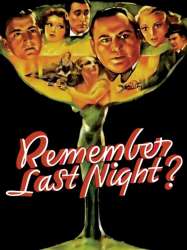
Remember Last Night? (1935)
, 1h21Directed by James Whale
Origin USA
Genres Comedy
Actors Edward Arnold, Constance Cummings, Robert Young, George Meeker, Sally Eilers, Reginald Denny
Rating65%





To celebrate their six-month anniversary, Long Island socialites Tony and Carlotta Milburn arrange a wild drinking party with friends, culminating in a stop at the restaurant owned by Faronea. They are unaware that Faronea is conspiring with Baptiste Bouclier, the chauffeur of party host Vic Huling, to kidnap Vic. The next morning the Milburns awake hung over to find Vic dead from a gunshot through the heart and his wife Bette missing. Tony calls his friend, district attorney Danny Harrison to investigate. Bette arrives with Billy Arliss at whose home she had slept. Because of their excessive drinking, no one can remember anything about what had happened the night before. As circumstantial evidence mounts against Tony, he calls in hypnotist Professor Karl Jones to help everyone try to recover their memories. Just as the professor is about to reveal the murderer, he is murdered.
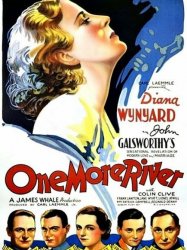
One More River (1934)
, 1h28Directed by James Whale
Origin USA
Genres Drama
Actors Diana Wynyard, Colin Clive, Frank Lawton, Mrs Patrick Campbell, Jane Wyatt, Reginald Denny
Rating67%





Clare, Lady Corven (Diana Wynyard) and Sir Gerald Corven (Colin Clive) are to all outward appearances a happily married upper class British couple. But privately, Lady Clare's husband is physically and emotionally abusive toward her, and one day she can take no more, and walks out of the relationship. Clare books passage on a ship, where she is befriended by a kind and handsome young man, Tony Croom (Frank Lawton). Though their relationship remains strictly platonic, Tony displays strong feelings for Lady Corven, which are duly noted by a private detective hired by Sir Gerald to keep tabs on his wife. Sir Gerald threatens to paint Clare's relationship with Tony in an unflattering light in court, this being a time when divorce was considered scandalous, especially among England's "privileged" classes.

The Invisible Man (1933)
, 1h8Directed by James Whale
Origin USA
Genres Science fiction, Thriller, Horror
Themes Films based on science fiction novels, Invisibilité
Actors Claude Rains, Gloria Stuart, Henry Travers, Una O'Connor, Forrester Harvey, Holmes Herbert
Rating75%





On a snowy night, a mysterious stranger, his face swathed in bandages and his eyes obscured by dark goggles, takes a room at The Lion's Head Inn in the English village of Iping in Sussex. The man demands that he be left alone. Later, the innkeeper, Mr. Hall (Forrester Harvey) is sent by his wife (Una O'Connor) to evict the stranger after he makes a huge mess in his room while doing research and falls behind on his rent. Angered, the stranger throws Mr. Hall down the stairs. Confronted by a policeman and some local villagers, he removes his bandages and goggles, revealing that he is invisible. Laughing maniacally, he takes off his clothes, making himself completely undetectable, and drives off his tormenters before fleeing into the countryside.

By Candlelight (1933)
, 1h10Directed by James Whale
Origin USA
Genres Comedy, Musical, Romance
Themes Théâtre, Films based on plays
Actors Elissa Landi, Paul Lukas, Nils Asther, Dorothy Revier, Lawrence Grant, Esther Ralston
Rating66%





During a European train journey, a nobleman's butler Josef (Paul Lukas) is mistaken for his employer Prince Alfred von Rommer (Nils Asther) by a beautiful woman, Marie (Elissa Landi), and he does nothing to disillusion her. In due course, the Prince himself arrives and is mistaken for his servant.
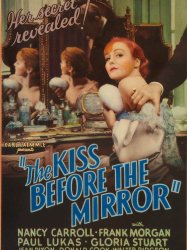
The Kiss Before the Mirror (1933)
, 1h7Directed by James Whale
Origin USA
Genres Drama, Thriller, Crime
Themes Théâtre, Films based on plays
Actors Nancy Carroll, Frank Morgan, Paul Lukas, Gloria Stuart, Jean Dixon, Donald Cook
Rating64%





A lawyer (Morgan) fears his own wife (Carroll) might be having an affair while he defends a cuckolded wife-killer.
 Connection
Connection


